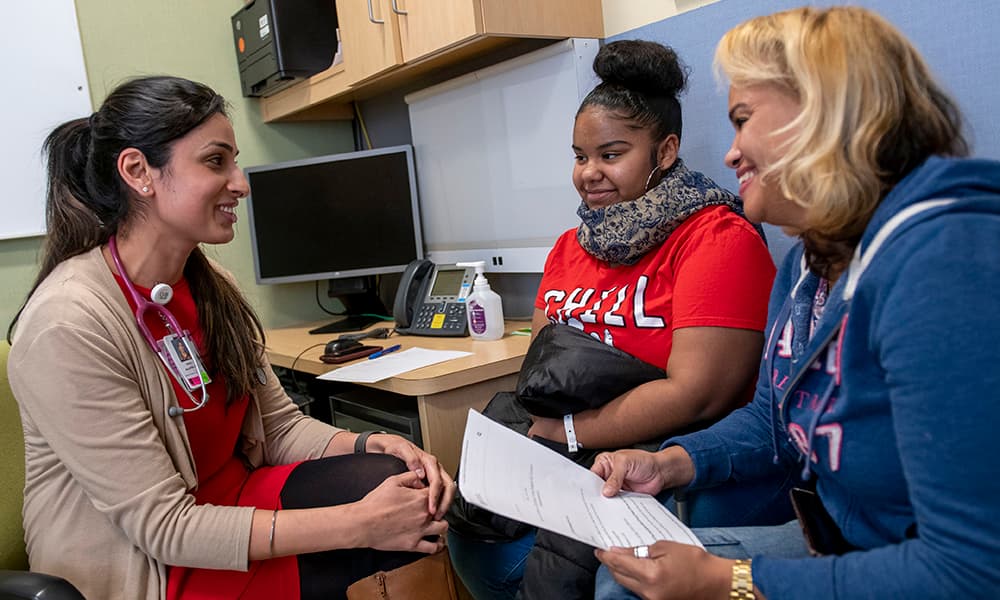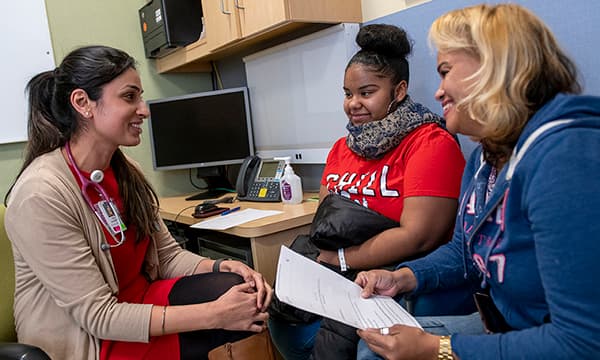كيفية إعطائه الجلوكاجون
الجلوكاجون هو دواء يستخدم لعلاج انخفاض مستوى السكر في الدم. في هذا الدليل، سوف تتعلمين كيفية إعطاء طفلك الجلوكاجون.
Weather AlertWe are monitoring the weather's impact on our services. If you are experiencing a medical emergency, call 911 or go to the nearest emergency department. Mass General Brigham's emergency departments remain open. For real-time updates and service changes, please check our Alerts page.View Alerts page
Contact Information
Yawkey Center for Outpatient Care
55 Fruit Street, Suite 6C
Boston,
MA
02114
Phone: 617-726-2909
Fax: 617-643-9140
Hours: Monday–Friday, 8:30 a.m.–5:00 p.m.
To schedule an appointment with a Mass General Brigham for Children pediatric specialist, please call 888-644-3248.
Physicians may call 888-644-3211 to refer a new patient.
Massachusetts General Hospital | Wentworth-Douglass Hospital
Every patient of the Pediatric Endocrine Unit has a personal endocrinologist. We work collaboratively with primary care physicians, other specialty caregivers, and—most importantly—patients and their families to deliver the highest quality of care.
Our physicians specialize in the diagnosis and treatment of all endocrine-related conditions of infants, children and adolescents, including:

Leora Allen, MD

Rebecca Fuhlbrigge, MD

Christopher Harwood, MD
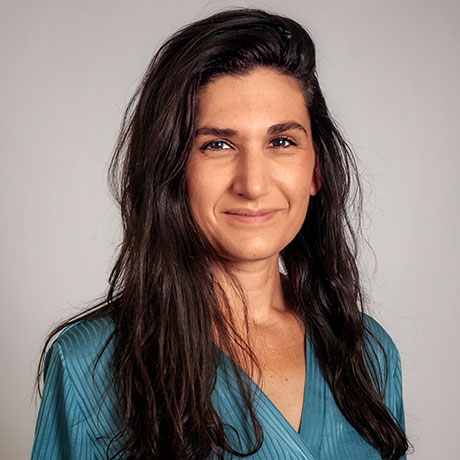
Maya Yogev Lifshitz, MD

Ana Lopez, MD

Amna Naveed, MBBS
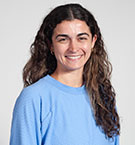
Jennifer Cicconi, RN

Gabrielle DiNapoli, RN

Evelyn Lozano, RN

Maureen O'Meara, NP

Samantha Thornton, RN

Mary Bennett, LICSW

Jacqueline Maya, MD
Dr. Maya’s interests lie in understanding modifiable risk factors that contribute to the development of childhood obesity to work towards interventions that decrease the risk of developing diabetes and other long term cardiometabolic complications over the life course. Her research focuses on identifying children that are most at risk as early as possible to intervene using targeted preventative approaches, with a focus on obesity risk factors during the prenatal period.

Ishita Jindal, MD
Dr. Jindal’s research interests include clinical investigations of the association of sleep and obesity in children. Her research has demonstrated that sleep parameters such as poor sleep quantity and quality are associated with decreased physical activity and energy expenditure in children. In addition, she is also interested in investigating cardiometabolic outcomes in children with obesity and youth onset diabetes. She is currently examining knowledge, attitudes, practices and beliefs of physicians for management of obesity with weight loss surgery in children and adolescents.
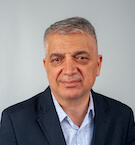
A. Kemal Topaloglu, MD
The activities of the hypothalamo-pituitary–gonadal (HPG) axis from late embryo to young adulthood provide essential inputs to human development. Dr. Kemal Topaloglu’s goal has been to gain full insight into the central regulation of the HPG axis throughout human life stages and particularly to determine what drives pubertal onset. Over the past 15 years, with the collaboration of his dear colleagues, Dr. Topaloglu has identified and seminally reported several genes associated with pubertal failure. The most notable of these are TAC3 (encoding neurokinin B), TACR3 (encoding the neurokinin B receptor), and KISS1 (encoding kisspeptin), which were instrumental in defining our current understanding of the GnRH pulse generator as the KNDy (Kisspeptin/NKB/Dynorphin) neurons in the hypothalamic arcuate nucleus. The neuropeptides, kisspeptin, and neurokinin B (encoded by TAC3 and KISS1, respectively), along with dynorphin, constitute the KNDy cells, in which each peptide had a distinct role: NKB as the start signal, kisspeptin as the output driving GnRH and dynorphin as the stop signal terminating each pulse. The reactivation of the KNDy cells at the beginning of the second decade of human life underlies the start of puberty, a major life event denoting the end of the childhood (juvenile) life stage and the beginning of another, adolescence (and subsequently young adulthood). This new life stage is characterized by developing secondary sex characteristics, psychosocial identity, and maturing reproductive capacity. Although we now roughly know the identity and inner mechanisms of the GnRH pulse generator, the stimulus that reactivates it after a prolonged quiescence during childhood to start puberty remains an enigma. Identification of such stimulus represents his current research challenge. Insufficiency of the HPG often results in delayed/absent puberty, which is a major cause of distress among affected adolescents. As a clinician, he is particularly interested in caring for children and adolescents with puberty problems.

Rachel Whooten, MD
I am a board-certified pediatric endocrinologist with a strong interest in how health behavior like physical activity, nutrition, and sleep can be targeted to prevent endocrine complications of childhood obesity. I completed my clinical and research fellowship within the Divisions of Pediatric Endocrinology and General Academic Pediatrics at Massachusetts General Hospital, with concurrent participation in the Harvard Pediatric Health Services Research and Institute for Healthcare Improvement Fellowships as well as completion of an MPH at the Harvard School of Public Health. I am currently a junior faculty member within the Department of Pediatrics at MGH, continuing my work in both General Academic Pediatrics and Endocrinology. My prior research has focused on strategies for the implementation of physical activity promoting policies, primarily within school-based settings.
To date, I have focused on community-based physical activity policies and interventions in childcare and school settings, as well as developing early life obesity prevention initiatives. This work has provided experience in community-based physical activity programs, qualitative analyses, and the importance of engaging with community partners to develop sustainable interventions. My current work examines the development of a common endocrine condition (polycystic ovary syndrome, or PCOS) with significant morbidity among young females and examines how physical activity behaviors may impact PCOS development.

Janaki Vakharia, MD
Dr. Vakharia’s interests are focused on improving health care delivery for young adults with chronic endocrine conditions as they transition to the adult health care setting and understanding the gaps in endocrine providers’ knowledge and resources for caring for complex young adult patients. She has designed a novel care model for young adults with diabetes that focuses on patients’ diabetes care, mental health, and overall well-being as they transition to the adult care setting. Dr. Vakharia has conducted a mixed methods pilot feasibility study on this model, and plans to continue with quality improvement, observational, and qualitative studies to better understand how to support and enhance comprehensive care for young adults with diabetes and other chronic endocrine conditions.
Pediatric Endocrinology Fellowship
The Pediatric Endocrinology Fellowship Program at Mass General Brigham for Children spans three years of training and prepares our fellows for careers as leaders in academic medicine and also clinical practice.
Pediatric Endocrine-Neuroendocrine-Sports Endocrine Research
Research within the Pediatric Endocrine-Neuroendocrine-Sports Endocrine Lab aims to further medical knowledge about common endocrine issues in athletes and girls with low-weight eating disorders. In particular, we focus our efforts on establishing findings that lead to the adaptation and improvement of medical care for female athletes and young girls and women with eating disorders.
Pediatric Research in the Metabolism Unit
The Metabolism Unit, housed in the MGH Endocrine Division, investigates broad themes of adiposity, metabolism, inflammation, ectopic fat deposition, and cardiovascular disease. The Unit includes both adult and pediatric research, with a cross-disciplinary approach aimed at tackling underlying themes in obesity and metabolism.
Nonalcoholic fatty liver disease, or NAFLD, is a common occurrence in individuals living with obesity and/or Type 2 diabetes, and it can also occur in lean individuals. NAFLD encompasses a spectrum from “simple steatosis” – having fat deposition in the liver cells without other changes – to “nonalcoholic steatohepatitis (NASH),” in which fat deposition is accompanied by inflammation, cellular damage, and/or scarring. NASH can lead to substantial liver damage and dysfunction, such that research into strategies for addressing NASH and NAFLD is greatly needed. We have previously demonstrated that administration of a growth hormone releasing hormone analog reduces liver fat and decreases the rate of progression to fibrosis in individuals with HIV. Current efforts including investigating the efficacy of growth hormone to reduce liver fat in young adults and the efficacy of growth hormone releasing hormone to ameliorate liver disease in adults with obesity and NAFLD.
Previous work in the Metabolism Unit has included characterization of mitochondrial function in children living with obesity, as well as work performed in adults to demonstrate various contributors to obesity including mitochondrial dysfunction and systemic inflammation. Current pediatric work in the unit aims to determine the efficacy of following guidelines for obesity treatment in the pediatric primary care setting as well as characterizing possible effects of in utero exposure to HIV on later-life metabolic and immune function.
Seeking overweight girls and boys 13-25 years old
Our Mission: To understand the effect of weight loss surgery versus no surgery (usual care) on bone density and strength and body composition.
6 total visits over 26 months (and an optional visit), including:
If interested, call Amita Bose at 617-643-0266 or email ANEresearch@partners.org.
We are interested in the effect of type 1 diabetes on bone density. We are looking for children and young adults ages 6-20 years with type 1 diabetes who are otherwise healthy in order to learn how their bone density changes over time.
Participation includes:
If interested, contact:
Kate Kilroe
Pediatric Endocrine Unit
Massachusetts General Hospital
617-724-3255
healthybones@partners.org
or visit our website.
We are interested in the effect of type 1 diabetes on bone density. We are looking for healthy children and young adults ages 6-20 years without diabetes in order to compare them to people with diabetes.
Participation includes:
If interested, contact Kate Kilroe
Pediatric Endocrine Unit
Massachusetts General Hospital
617-724-3255
healthybones@partners.org
or visit our website.
Requirements for participation
Low-Weight or Athletic young women 16-26 years of age not getting their periods
Study Details
Payment for participation up to $500 and parking/ transportation expenses offered
Visit our website: www.ANEresearch.com
The Mass General Brigham for Children Pediatric Endocrine Unit’s values are seated in the respect we show each other, our patients and their families. Through kindness and dedication and with the highest integrity we strive to provide the most equitable, patient-centric, holistic, and state-of-the-art care for children, families, and our community.
The vision of the Division of Pediatric Endocrinology is to:
The mission of the Division of Pediatric Endocrinology is to:
Care teams across Mass General Brigham for Children are available to provide care via phone or online video visits. Call 888-644-3248 to learn more.
الجلوكاجون هو دواء يستخدم لعلاج انخفاض مستوى السكر في الدم. في هذا الدليل، سوف تتعلمين كيفية إعطاء طفلك الجلوكاجون.
Type 2 diabetes is a condition that causes very high levels of sugar in the blood. If you are close to developing diabetes, there are certain things you can do to prevent it.
Learning that your child has diabetes can be a shock to your child and to your family. Below are common worries you can expect from your child after a diabetes diagnosis.
Depression is a mood disorder that causes feelings of sadness, numbness or loneliness for long periods of time. On this webpage, you will learn the difference between depression and diabetes burnout.
Carbohydrates, or carbs, provide energy for your body. Certain foods contain carbohydrates that will raise your blood sugar, while other foods do not have carbs and will not raise your blood sugar.
Learning that your child has diabetes can be a shock to your child and to your family. Below, you will learn which feelings your child might experience after a diabetes diagnosis.
